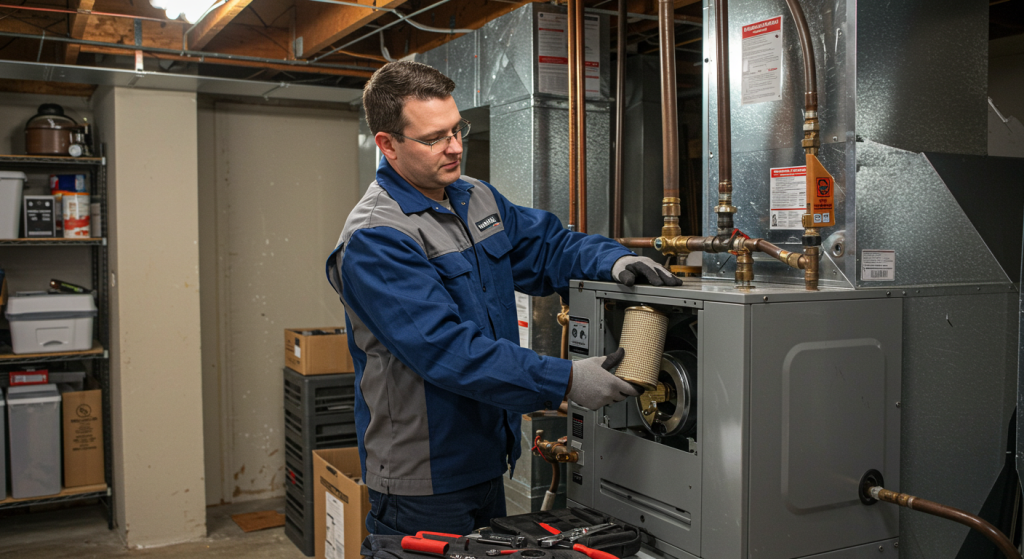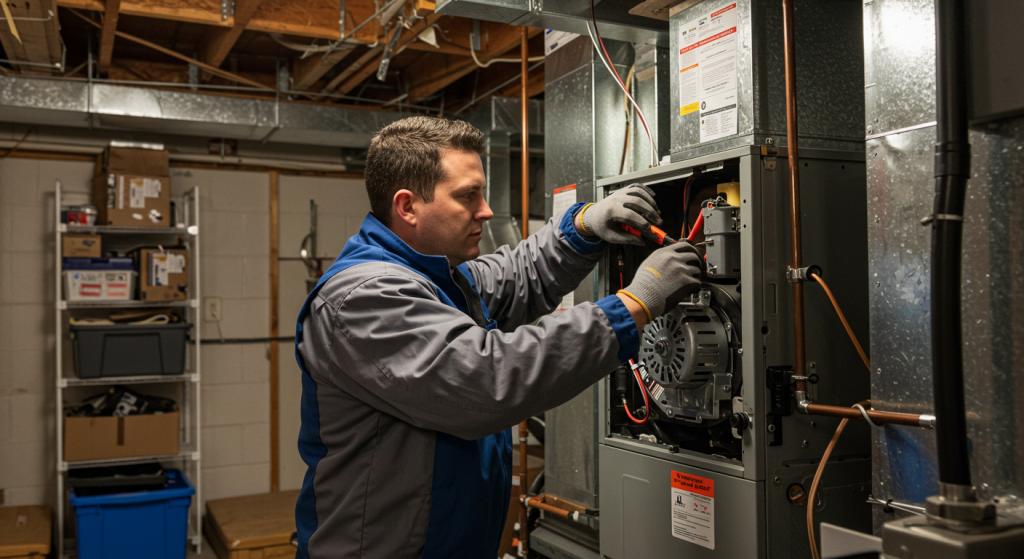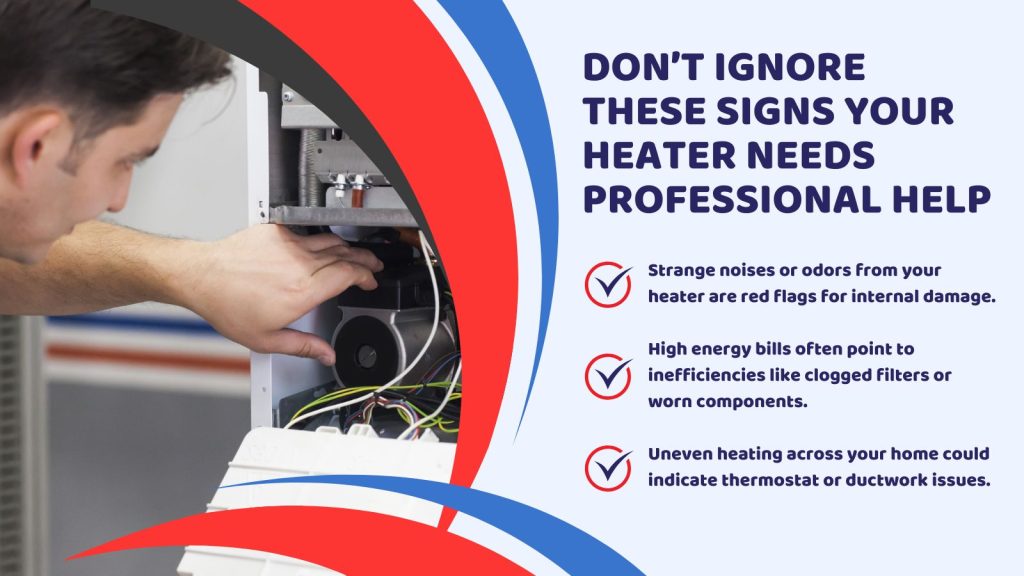Thinking about getting a new heating system? Whether your furnace is on its last leg or you’re just looking to upgrade to something more efficient, getting a heating equipment estimate is a key first step. But here’s the thing — not all estimates are created equal. And if you’ve ever tried comparing two estimates side-by-side, you probably know it can get confusing fast.
Let’s break it down so you know exactly what to look for, and how to make sure you’re getting the best deal — not just the cheapest price.
Obie Comfort Solutions Blog: Archive for the ‘Heating Repair’ Category
Comparing Solutions – Understanding the Value of Heating Equipment Estimate
Monday, March 10th, 2025Oil Furnace Repair vs. Gas Furnace Repair: What’s the Difference?
Thursday, January 23rd, 2025When it comes to maintaining and repairing your home’s heating system, understanding the differences between oil furnace and gas furnace repair is crucial. At Obie Comfort Solutions, we bring years of expertise and a customer-focused approach to ensure your heating system operates efficiently and safely. Here’s what you need to know about the distinctions between these two furnace types.

Key Takeaways
- Oil furnaces require more frequent maintenance, dealing with issues like soot buildup and ignition problems, while gas furnaces generally need less upkeep but come with concerns like gas leaks and carbon monoxide emissions.
- Repair costs for oil furnaces are higher upfront, but gas furnaces offer more cost-effectiveness over time due to lower installation and maintenance costs.
- Choosing between oil and gas furnaces depends on factors like cost, efficiency, location, and household needs, with gas being more common in urban areas due to the availability of natural gas.
Key Differences in Repair Needs
The repair needs of oil and gas furnaces differ significantly due to their operational designs. Oil furnaces require more frequent cleaning and maintenance because of soot buildup, whereas gas furnaces are generally easier to maintain.
Common Oil Furnace Issues
Oil furnaces are durable and provide consistent heat, but they often face challenges like:
- Soot Buildup: Clogs filters and reduces efficiency, requiring regular cleaning.
- Fuel Supply Issues: Can lead to inconsistent heating.
- Ignition Problems: Prevent the furnace from starting.
Regular maintenance and attention to these issues ensure reliable operation.
Common Gas Furnace Issues
Gas furnaces require less frequent maintenance but can present significant safety concerns:
- Pilot Light Failures: Prevent the furnace from starting.
- Gas Leaks: Pose serious safety risks.
- Carbon Monoxide Emissions: Require proper venting to avoid health hazards.
Prompt inspections and repairs help mitigate these risks and maintain efficiency.
Maintenance Requirements
Both oil and gas furnaces need routine maintenance to perform optimally. However, oil furnaces demand more frequent attention due to their operation.
Oil Furnace Maintenance
Key maintenance tasks for oil furnaces include:
- Filter Replacement: Replace oil filters twice each heating season to avoid clogs.
- Combustion Chamber Cleaning: Prevents corrosion and maintains performance.
- Regular Inspections: Catch minor issues early to prevent costly repairs.
Gas Furnace Maintenance
While less intensive, gas furnace maintenance includes:
- Gas Line Checks: Ensure there are no leaks.
- Proper Venting: Prevents dangerous carbon monoxide buildup.
- Seasonal Inspections: Maintain performance and safety.
Safety Considerations
Safety is a priority with any heating system, and each furnace type presents unique risks:
Oil Furnace Safety
Oil furnaces are generally safer than gas furnaces in terms of detecting and mitigating risks. Key considerations include:
- Fire Risk: Heating oil is less combustible but must be cleaned promptly if spilled.
- Carbon Monoxide Risk: Rare in oil furnaces compared to gas systems.
Gas Furnace Safety
Gas furnaces require vigilance due to risks like:
- Carbon Monoxide Poisoning: Ensure proper venting and install CO detectors.
- Gas Leaks: Routine inspections can prevent dangerous situations.
Cost of Repairs
Oil furnaces typically have higher upfront repair costs due to frequent maintenance needs and fuel storage requirements. In contrast, gas furnaces are more cost-effective over time because they:
- Have lower installation costs.
- Require less frequent maintenance.
- Operate on more stable and generally lower-priced fuel.
Energy Efficiency Impact
Gas furnaces often have higher energy efficiency ratings, making them a more environmentally friendly and cost-effective option over time. Oil furnaces, while less efficient, can still provide reliable heating when properly maintained. Upgrading to modern oil furnaces improves efficiency and reduces environmental impact.
Professional Expertise Required
Both furnace types require skilled technicians for safe and effective repairs. Gas furnace repairs are often more complex, involving components like controls and igniters. At Obie Comfort Solutions, our NATE- and EPA-certified technicians ensure expert care for both oil and gas furnaces.
Choosing Between Oil and Gas Furnaces
The choice between oil and gas furnaces depends on:
- Cost: Gas is generally more economical in the long term.
- Efficiency: Gas furnaces typically offer better energy efficiency.
- Location: Gas furnaces are more common in urban areas due to natural gas availability.
- Household Needs: Oil heating offers more control over fuel supply but requires additional storage.
Contact Obie Comfort Solutions for Expert Furnace Repair
Need expert furnace repair services? Contact Obie Comfort Solutions for professional care. We offer:
- Comprehensive repair services for both oil and gas furnaces.
- Free consultations to assess your heating needs.
- Convenient scheduling options online or by phone at 617-415-1522.
Summary
Understanding the differences in repair needs, maintenance requirements, safety considerations, and costs for oil and gas furnaces helps homeowners make informed decisions about their heating systems. While oil furnaces offer durability and control over fuel, gas furnaces provide better efficiency and cost-effectiveness.
By staying informed and working with professionals like Obie Comfort Solutions, you can ensure the safe and efficient operation of your furnace, keeping your home warm and comfortable throughout the winter.
Frequently Asked Questions
What are the common signs that my oil furnace needs repair?
Soot buildup, fuel supply issues, and inadequate heat production are common signs that your oil furnace may need repair.
What maintenance tasks are necessary for gas furnaces?
Tasks include checking for gas leaks, ensuring proper venting, and scheduling regular inspections to maintain efficiency and safety.
Are oil furnaces more expensive to repair than gas furnaces?
Yes, oil furnaces typically have higher repair costs due to their maintenance demands and additional fuel storage expenses.
How can I ensure the safe operation of my gas furnace?
Ensure regular maintenance, proper venting, and routine checks for gas leaks. Install carbon monoxide detectors for added safety.
Why should I choose Obie Comfort Solutions for my furnace repair needs?
Obie Comfort Solutions offers expert services from certified technicians, free consultations, and reliable solutions for both oil and gas furnaces.
The Most Common Furnace Repair Problems and How to Fix Them Quickly
Thursday, January 23rd, 2025At Obie Comfort Solutions, we understand how frustrating furnace problems can be, especially during the colder months. Our family-owned company, rooted in values of trust and professionalism, is here to help you identify and address furnace issues quickly and effectively. This guide covers the most common furnace problems and offers actionable solutions to keep your home warm and comfortable.

Key Takeaways
- Common furnace issues include airflow obstructions, ignition system failures, and thermostat malfunctions, which can lead to inefficiency and discomfort.
- Regular maintenance, such as changing air filters and cleaning vents, is essential for preventing costly repairs and ensuring optimal furnace performance.
- Noisy furnaces often signal underlying problems that should be addressed promptly to prevent further damage.
Identifying Common Furnace Problems
Imagine adjusting your thermostat, expecting a cozy home, only to find the house still cold. This frustrating scenario is often a sign of underlying furnace issues. Below are some of the most common problems homeowners face:
Airflow Obstructions
Airflow obstructions are a leading cause of furnace inefficiency. When air can’t circulate properly, your furnace works harder, leading to increased wear and tear.
- Dirty Air Filters: Dust-clogged filters force your furnace to overwork, reducing efficiency. Replace filters every 1–2 months, especially during high-usage seasons.
- Blocked Vents: Check vents for obstructions like furniture or heavy dust. Clearing these ensures even heating and proper airflow.
Ignition System Failures
Modern gas furnaces often use electric ignition systems, which can fail due to dirt or faulty components.
- Faulty Pilot Light: If your pilot light won’t stay lit, ensure the gas valve is open. Persistent issues may require cleaning the flame sensor or professional repairs.
- Electric Ignition Issues: Cracked ignitors or insufficient voltage can prevent startup. Seek professional inspection for these problems.
Blower Motor Issues
The blower motor circulates warm air through your home. If it fails, you may notice uneven heating or strange noises.
- Broken Blower Belt: A squealing noise often indicates a slipping or broken belt, which needs replacement by an HVAC technician.
- Worn Bearings: Scraping sounds suggest worn blower bearings, requiring immediate attention to avoid further damage.
Heat Exchanger Concerns
The heat exchanger warms the air before distribution. A cracked heat exchanger can release dangerous gases, such as carbon monoxide.
- Signs of a Cracked Heat Exchanger: Unusual odors, discolored flames, or soot buildup near burners indicate potential issues. Call a technician immediately for inspection and repair.
Thermostat Troubles
A malfunctioning thermostat disrupts heating cycles and may cause continuous running or no heating at all.
- Dead Batteries: Replace batteries if the display is blank.
- Faulty Wiring: Professional inspection is necessary for unresponsive thermostats or wiring issues.
Electrical Component Failures
Problems with the furnace’s electrical system can cause irregular heating or complete failure.
- Tripped Circuit Breaker: Reset the breaker if it trips. Persistent issues may indicate deeper electrical problems that require professional help.
- Malfunctioning Limit Switch: A faulty limit switch may keep the blower running continuously. Replace it promptly to prevent overheating.
Gas Supply Problems
Gas flow issues prevent your furnace from heating properly.
- Closed Gas Valve: Ensure the valve is open. If the pilot light won’t stay lit, consult a technician.
- Gas Leaks: If you smell gas, evacuate your home and contact your utility company immediately.
Condensate Drain Line Clogs
A clogged condensate drain line can cause water damage and disrupt furnace operation.
- Cleaning the Drain Line: Use a wet/dry vacuum or compressed air to clear blockages. Regular maintenance prevents future clogs.
Noisy Furnaces
Unusual noises, like banging or squealing, often signal mechanical issues. Ignoring these can lead to more costly repairs.
- Banging Sounds: Commonly caused by thermal expansion in ductwork, particularly in older systems. Regular maintenance minimizes this.
- Squealing or Grinding: These noises may indicate belt or bearing issues. Turn off the furnace and call a technician for repairs.
Preventative Furnace Maintenance Tips
Proactive maintenance is the best way to avoid breakdowns and keep your furnace running efficiently. Here’s how:
- Replace Filters Regularly: Change air filters every 1–3 months to maintain airflow.
- Inspect Ductwork: Seal leaks to prevent energy loss and ensure proper heating.
- Schedule Annual Inspections: A professional can identify and fix potential issues before they escalate.
- Check Pilot Light Color: A steady blue flame indicates normal operation; yellow or orange suggests a problem.
Summary
Addressing common furnace repair problems promptly can save you from discomfort and costly repairs. From airflow obstructions and ignition failures to thermostat and electrical issues, early detection and regular maintenance are key to a reliable heating system.
At Obie Comfort Solutions, we’re here to provide trusted, professional HVAC services tailored to your needs. Whether it’s routine maintenance or emergency repairs, you can count on our licensed, NATE-certified technicians to deliver exceptional service. Contact us today to ensure your furnace operates at peak performance throughout the winter.
Frequently Asked Questions
How often should I change my furnace filters?
Change furnace filters every 1–2 months during heavy usage periods to maintain efficiency and airflow.
What should I do if my furnace is making strange noises?
Turn off the furnace and contact a professional technician to inspect the issue. Strange noises often signal mechanical problems.
How can I tell if my heat exchanger is cracked?
Signs include unusual odors, yellow or orange flames, white soot near burners, and rattling or popping noises. Prompt inspection ensures safety.
What should I do if my pilot light won’t stay lit?
Ensure the gas valve is open and clean the flame sensor. If the issue persists, consult an HVAC technician.
How can I prevent my furnace from breaking down?
Regular maintenance, including filter changes, duct sealing, and annual professional inspections, helps prevent breakdowns and ensures efficient operation.
Top Tips on How to Find Emergency Furnace Repair Near You
Thursday, January 23rd, 2025When your furnace fails unexpectedly, finding reliable emergency furnace repair near you becomes crucial. At Obie Comfort Solutions, we understand the stress of unexpected heating problems and are here to guide you with practical steps for identifying and securing quality repair services quickly. With our family-oriented approach and commitment to exceptional service, we strive to provide the peace of mind you need in an emergency.

Key Takeaways
- Early detection of furnace issues, such as inconsistent heating or unusual noises, can prevent costly emergency repairs.
- Researching local HVAC companies, checking credentials, and reading customer feedback are essential for finding trustworthy services.
- Comparing multiple quotes and assessing emergency availability ensure fair pricing and timely service when you need it most.
Recognize the Signs of Furnace Issues
Catching furnace problems early is essential for avoiding costly emergency repairs. Here are some common warning signs:
- Inconsistent Heating: Uneven temperatures in your home or frequent cycling of your furnace may indicate blocked ducts or thermostat malfunctions.
- Unusual Noises: High-pitched or grinding sounds often point to mechanical issues or loose components within your furnace.
- Electrical Problems: If your furnace won’t turn on or frequently trips breakers, it’s time to call a professional.
- Rising Energy Bills: A sudden increase in energy costs may signal that your furnace is running inefficiently.
Addressing these issues promptly helps prevent a complete breakdown and ensures your home stays warm and comfortable.
Research Local HVAC Companies
Finding a dependable HVAC company requires thorough research. Start by creating a list of local providers using search engines, online directories, and recommendations from friends or neighbors. Personal referrals often provide insight into the quality and reliability of a company.
Steps for Effective Research:
- Review Online Profiles: Check websites and social media pages for information about their services, expertise, and credentials.
- Verify Emergency Services: Ensure the company offers 24/7 repair services for urgent situations.
- Request Quotes: Call to inquire about emergency repair costs and timelines.
At Obie Comfort Solutions, we offer round-the-clock emergency furnace repair and ensure every interaction reflects our commitment to treating customers like family.
Verify Credentials and Experience
Ensuring your HVAC contractor is qualified and experienced is key to effective and reliable repairs. Look for the following:
- Licenses and Certifications: Verify that the company holds necessary state and local licenses. Certifications like NATE (North American Technician Excellence) and EPA 608 indicate advanced training and compliance with industry standards.
- Insurance Coverage: Confirm the contractor has liability insurance and workers’ compensation to protect against accidents or damages.
Customer Feedback: Read reviews and testimonials to gauge customer satisfaction. Consistent praise for knowledgeable technicians and prompt service is a strong indicator of reliability.
Compare Multiple Quotes
Comparing quotes from multiple HVAC companies helps you find fair and competitive pricing. Request detailed written estimates that outline the scope of services and parts included. While it may be tempting to choose the lowest bid, prioritize value—including service quality, reliability, and reputation.
Assess Emergency Availability
Quick response times are vital during an emergency. Choose an HVAC company like Obie Comfort Solutions that offers 24/7 repair services and guarantees prompt assistance. Inquire about their typical repair timelines to ensure they can meet your needs during critical moments.
Evaluate Communication and Customer Service
Effective communication is a hallmark of excellent HVAC service. Reliable companies should provide multiple ways to connect, such as phone, email, or social media. Look for transparency in pricing and clear explanations of repair options. At Obie Comfort Solutions, our friendly staff ensures you’re informed every step of the way, reflecting our motto: “We’re not comfortable until you’re comfortable.”
Ask About Insurance and Guarantees
Protect your investment by choosing a company that provides proof of insurance and satisfaction guarantees. Our promise at Obie Comfort Solutions is simple: if you’re not happy, we’ll make it right. This assurance underscores our dedication to quality and customer satisfaction.
Utilize Second Opinion Offers
Seeking a second opinion can help you feel confident about your repair or replacement decisions. Obie Comfort Solutions offers free second opinions on any recent diagnosis or quote, providing unbiased advice to ensure you’re making the best choice for your home.
Proactive Maintenance Tips
The best way to avoid emergencies is through regular furnace maintenance. Certified HVAC technicians can identify potential issues and ensure your system operates efficiently. Simple tasks like replacing air filters every 1-3 months and scheduling annual professional inspections can prolong your furnace’s lifespan and improve its performance.
Additional Maintenance Tips:
- Seal ductwork to prevent heat loss and improve efficiency.
- Use a programmable thermostat to maintain consistent heating while saving energy.
- Enhance insulation to reduce strain on your heating system.
Summary
Recognizing early furnace issues and conducting thorough research on local HVAC providers are crucial steps in finding reliable emergency repair services. By verifying credentials, comparing quotes, and prioritizing customer service, you can ensure quality repairs when you need them most. Regular maintenance further reduces the risk of emergencies and keeps your home warm and comfortable.
At Obie Comfort Solutions, we’re committed to providing exceptional, family-oriented service that you can trust. Contact us today for all your furnace repair needs, and experience the difference that personalized care makes.
Frequently Asked Questions
What are the signs that indicate I need emergency furnace repair services?
Signs include inconsistent heating, unusual noises, frequent cycling, a sudden increase in energy bills, or a furnace that fails to turn on. Prompt attention prevents further damage and ensures your home stays comfortable.
How can I find a trustworthy furnace repair provider near me?
Research local HVAC companies, read customer reviews, and verify their credentials. Ensure they offer 24-hour emergency services and have a good track record for reliability.
Why is it important to verify the credentials and experience of HVAC professionals?
Verifying credentials ensures compliance with industry standards and protects you against potential liabilities, while experienced technicians are better equipped to resolve issues effectively.
What should I consider when comparing multiple quotes for furnace repair services?
Focus on detailed written estimates that outline services and costs. Prioritize value over price alone to ensure you receive high-quality, reliable service.
How can proactive maintenance help prevent emergency furnace repairs?
Proactive maintenance ensures efficient furnace operation, extends the system’s lifespan, and reduces the risk of sudden breakdowns. Regular tasks like filter changes and duct sealing are key to preventing costly repairs.
How to Tell if Your Heater Needs Repair
Monday, November 25th, 2024As temperatures drop, the last thing anyone wants is a malfunctioning heater during the fall and winter chill. Whether you rely on a furnace, boiler, heat pump, or electric heating system, keeping your equipment in good working order is essential for staying warm and safe. But how can you tell if your heating system needs professional attention? Here are some common signs to watch that indicate it’s time for heating repair in Framingham, MA, and/or the MetroWest area.



